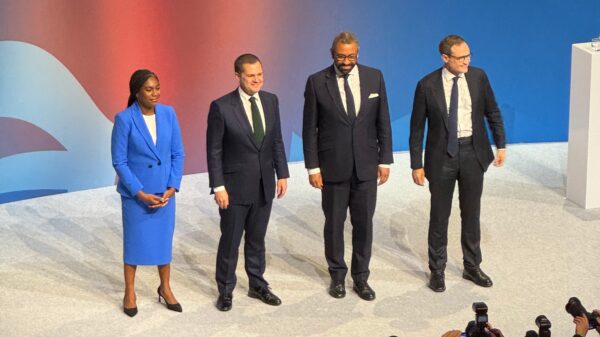Staff writer Tim Gribble examines the independence and conduct of the BBC amidst a sequence of scandals.
On the afternoon of March 7, the UK’s beloved Match of the Day presenter, Gary Lineker, decided to pick up his phone and criticise some newly introduced immigration policy. What ensued from this single entry into the infinity of the internet was not only Lineker being made to ‘step back’ from presenting Match of the Day, but an explosion of debate about British news media and the BBC’s place in it.
A debacle rooted in the scrutiny of immigration policy has flowered into a wider discussion of the BBC’s impartiality and general credibility. Now, damning evidence reveals that the BBC has been regularly self-censoring headlines to fit the wishes of Downing Street. This has emboldened the critics who claim that the BBC caved to Tory pressure in the case of Lineker. In the context of an ever-present negotiation over the future of BBC funding and the entanglement of BBC Chairman Richard Sharp with the finances of ex-boss Boris Johnson, these events paint an ugly picture of the position of the BBC.
Future in doubt
The BBC has been under more pressure than usual in the past two years. Its very future is on the line as Tory culture warriors demand the phase-out of funding, while the current BBC chairman has been under the microscope for failing to declare his involvement in a loan paid to former Conservative Prime minister Boris Johnson. It is unclear if the current plan to scrap the license fee in 2027 will actually come to pass. Yet the issues facing the corporation are mounting up nonethelessless.
The announcement that the flat license fee that funds the BBC would be frozen for two years came in January 2022. As the world of streaming continues to grow, the TV license evasion rate rose to 8.9%. The funding freeze has meant that the BBC has had to make significant short-term cuts into its programme budgets. In the long-term, the complete abolition of the license fee would necessitate an entirely new funding system, for which all of the options have their drawbacks. Director-General of the BBC Tim Davie criticised the decision after calculations revealed that it would leave the BBC with a funding gap of £285 million by 2027. He criticised Culture Secretary Nadine Dorries, saying that it should not be up to one person to decide the funding model. It leaves the future of the BBC in a realm of uncertainty.
Shaky leadership
The future of the BBC is currently being re-negotiated in the struggle to determine its future in the world of broadcasting. At a time when it is so needed, stable leadership is far from sight.
Since his instalment as Chairman of the BBC, Richard Sharp has caused far more problems for the BBC’s credibility than he has solved. Sharp was exposed for facilitating a loan for former prime minister Boris Johnson, a transaction which he did not notify the BBC of before he was appointed as chairman. An investigative committee found that he “failed to disclose” his involvement and that his actions “undermine confidence in the public appointments process”, through these “significant errors in judgement”. Sharp has since admitted that he acted as a sort of “introduction agency” for this loan.
The Lineker situation could not have come at a worse time, with the scandal surrounding Sharp still potent. It was little more than a month ago that veteran broadcaster Jonathan Dimbleby called for Sharp to “fall on his sword”. A chairman engulfed in scandal lying about financial involvement with Tory ministers already puts the BBC in a dubious position in terms of impartiality and perceived credibility. Uncertainty regarding the BBC’s short-term and long-term funding place its future in the unknown. In this already precarious climate, any missteps could push the BBC’s credibility to the limit…
Lineker at the back post
It is near-impossible for there to be a week in 2023 without a Twitter-related disaster. It is almost refreshing that this one does not concern the attention-grabbing antics of Elon Musk. Instead, it involves sports presenter Gary Lineker, a much loved but also often polarising figure. The sports presenter allegedly broke impartiality rules after criticising Prime Minister Rishi Sunak and Home Secretary Suella Braverman’s new immigration bill on Twitter. The policy aims to stopping the small boats from bringing tens of thousands of migrants and refugees across the channel each year. The controversial policy sparked immediate outrage over the protections it removes from Channel-crossers, with home secretary Suella Braverman admitting that there was a 50% chance that the policy is incompatible with the European Convention on Human Rights (ECHR).
Few were more incensed by the proposed policy than Lineker. In a short tweet, Lineker condemned the government for exaggerating the influx of refugees into England, remarking that the UK currently take “far fewer refugees” than other European countries. The part of Lineker’s Tweet that caused the most controversy was his comparison of language used in the bill as similar to that of “Germany in the 1930s”, a clear reference to fascist or pre-fascist policies. Many disagreed with his comparison of the UK government to Nazi Germany – none more than Braverman herself, who claimed that it diminished the tragedy of the Holocaust. Among those who took issue with Lineker’s Tweet was his main employer: Director General of the BBC, Tim Davie.
Inconsistency
Tim Davie came into the BBC on 1 September 2020, promising to prioritise restoring trust in impartiality. Specifically, he wanted to crack down on staff airing their opinion on social media. “If you want to be an opinionated columnist or a partisan campaigner on social media then that is a valid choice, but you should not be working at the BBC”, he said.
He was soon faced with the difficulties of enforcing impartiality, impartially. A year into his position, Davie had already faced controversies surrounding his decision to withdraw from the Stonewall diversity scheme. There were also suspicions that BBC executive Marcus Ryder’s application to be editor of BBC Radio Newsbeat was rejected due to his connections to anti-racism groups. Davie’s attempts to restore trust in the impartiality of the BBC have unsurprisingly only led to more debate over who gets to decide the exact parameters of impartiality.
In the case of Lineker, is not clear whether impartiality rules were violated. There is ambiguity regarding the expression of opinion from employees not involved in news or politics. The conclusion that he broke the guidelines would only be one interpretation of the rules – but crucially, whether that interpretation is right is largely beside the point here. The BBC’s reaction to Lineker’s online expression of opinion is inconsistent, since many almost identical situations having been left unenforced in the past.
Alan Sugar, star of the BBC show ‘The Apprentice’, made a far more assertive Nazi comparison. In March 2018, Sugar posted a mocked-up picture of former Labour leader Jeremy Corbyn next to Adolf Hitler on Twitter. He remained with the BBC unimpeded, only deleting the Tweet after pressure from the Labour Party.
Even since Tim Davie’s appointment, there have been frequent expressions of political opinion by high-profile BBC employees outside of the newsroom which have been made without punishment. Martin Lewis on Radio 5 Live has regularly criticised government policy and Michael McIntyre openly criticised Rishi Sunak, Boris Johnson and Chris Pincher in a 2022 performance. This is simply to name a few examples. The singling out of this particular Tweet, considering with Lineker’s oft-repeated political values and the size of his audience, makes it somewhat difficult to believe that the tax-funded news broadcaster simply acted valiantly in the name of neutrality.
Pressure brought to light
New evidence released by the Guardian on March 15 feeds into the perception that the BBC was, in the words of former director general Greg Dyke, “bullied” into this decision. The evidence, including WhatsApp messages and emails, show that the BBC was told by government ministers to avoid using the word ‘lockdown’ in the early stages of the pandemic. Journalists were asked to “turn up the skepticism” when covering Labour. A BBC insider also told the Guardian that “headlines have been determined by calls from Downing Street on a very regular basis”.
The timely release of this information makes the exact degree to which the BBC’s decision over Lineker was motivated by political pressure irrelevant. Any perceptions that the BBC is being excessively influenced by the government will now be be confirmed in the minds of many. This has even led to the somewhat ridiculous position of BBC employees interviewing their superiors about their impartiality. In enforcing its the rules selectively, BBC management have only enhanced these suspicions of inappropriate government influence. This couldn’t have come at a worse time.
A way forward?
The BBC is a unique broadcaster. It is made distinct by its reliance on funding from the taxpayer and defined by its duty to report impartially, unencumbered by the wishes of the government. The latter is as in doubt as it has ever been after this week’s events – a crisis made more pertinent by the climate of uncertainty about the future of the former.
The BBC faces an uphill battle to clarify what it represents in today’s world. Will its unique place in broadcasting slowly fade, as it is eclipsed by the world of streaming and news corporations? Will it fall under greater government control? Or will it fight to regain trust in its dedication to impartiality in a polarised world? At a time when divisions are widening and culture wars dominate the headlines, a space for neutrality is simultaneously becoming harder to maintain and more important for consumers.
Perhaps it is possible to reignite optimism in the British Broadcasting Corporation, but not under the current conditions. The BBC will need to drastically change their trajectory in order to do so.















